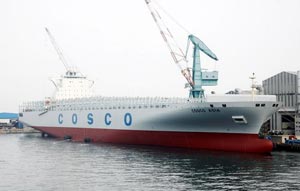

BEIJING -- As a young company, China's largest private shipbuilder, Rongsheng Heavy Industries, which just celebrated its 8th birthday last week, did not expect to brace the winter of its industry so soon.
The company's operating revenues for 2012 stood at 7.9 billion yuan ($1.3 billion), down 50 percent year-on-year, forcing the company to downsize its employees from 40,000 to 8,000 in two years, according to company president Chen Qiang.
The number of shipyards surged from hundreds in 2000 to more than 3,000 by 2007, when shipyards, especially those with private investment like Rongsheng, exploded as a symbol of the country's booming economy, leading to severe overcapacity.
The shipbuilding oversupply is only the tip of the iceberg of China's overcapacity. Other heavy industry sectors, and even strategic emerging industries, such as wind farms and photovoltaic plants, have also seen serious overcapacity, which experts believe is caused by too much involvement from local governments.
"Because of the prevailing role of local governments, the current overcapacity situation has deviated from normal levels under the market economy," said Feng Fei, head of industrial economic research at the Development Research Center of the State Council, China's cabinet. "The market's role in controlling production capacity and restraining excessive capacity has malfunctioned."
According to the Ministry of Industry and Information Technology, the capacity utilization rate of industrial enterprises was only 79 percent in the first half of this year. A capacity utilization rate of less than 70 percent is dangerous and could trigger vicious competition, according to experts.
Chinese Premier Li Keqiang said at a video conference on November 1 that the central government has made transformation of government functions a major work agenda item in order to release more market vitality.
He urged local governments to transform their administrative functions and press ahead with institutional reforms, saying these efforts will better balance the government's relations with the market and society.
Calls from the market
In the 2011-2015 development plans of 32 provincial-level areas of the Chinese mainland, 16 provinces, municipalities or autonomous regions included iron and steel production as a key industry, and 30 of them emphasized developing new energy, both of which are already oversupplied.
Local governments have been attracting large industrial projects to boost local gross domestic product as well as tax revenues. Meanwhile, investors prefer government-targeted sectors to ensure approval from local governments, which has worsened the oversupply problem.
Chi Fulin, director of the China (Hainan) Institute for Reform and Development, said the Chinese government's bailout efforts following the 2008 global financial crisis contributed greatly to the world's economic recovery, but they also aggravated government interference in the market.
 Models at Spyder pavilion at SEMA Show
Models at Spyder pavilion at SEMA Show
 Models at Anso pavalion at SEMA Show
Models at Anso pavalion at SEMA Show
 Modified Ford Fiesta by 3D Carbon at SEMA Show
Modified Ford Fiesta by 3D Carbon at SEMA Show
 Modified Ford Fiesta ST by MRT at SEMA Show
Modified Ford Fiesta ST by MRT at SEMA Show
 Modified Ford Fiesta ST by COBB at SEMA Show
Modified Ford Fiesta ST by COBB at SEMA Show
 Hong Kong Optical Fair Kicks off
Hong Kong Optical Fair Kicks off
 The predicted christmas best gifts for children
The predicted christmas best gifts for children
 Voyage to a sustainable future
Voyage to a sustainable future